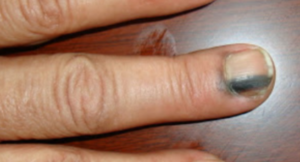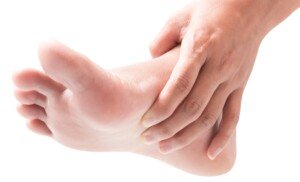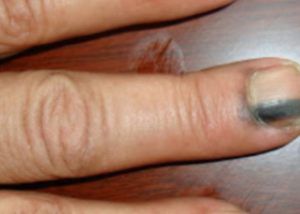Nodular Melanoma: What You Should Know About this Killer

Nodular melanoma is a particularly lethal form of cancer that disregards the ABCDE guidelines that are so publicized about melanoma.
Delayed diagnosis is more common with nodular melanoma than with the more common superficial spreading type. (more…)
Is a Mole Normal if It’s Brown and Grey or Can It Be Melanoma?

A normal mole is supposed to be one color, or at least, two shades of a color.
But brown and grey are two completely different colors. Is this melanoma? (more…)
9 Common Pediatric Dental Procedures Parents Need to Know

Kids’ dental care or pediatric dental care comes with its own set of unique challenges due to several factors such as age, diet and oral hygiene.
Hutchinson’s Sign vs. Pseudo-Hutchinson’s Sign

Are there features about melanoma’s Hutchinson’s sign that are different than those found in pseudo-Hutchinson’s sign – which has causes other than melanoma?
What Cancer Other than Melanoma Can Affect a Nail?
Subungual melanoma is a cancer affecting a fingernail or toenail and often has a poor prognosis.
However, melanoma isn’t the only cancer that can affect a nail. (more…)
Can Pin Size Red Dots on the Skin Be Caused by MS?
There are many causes for red dots and spots on the skin.
If you have health anxiety, multiple sclerosis may be the first thing that comes to your mind as to the possible cause of newly-noticed red dots on your skin. (more…)
Toenail (Subungual Hematoma) vs. Melanoma: Visible Differences
The appearance of blood under a toenail can closely resemble a melanoma – and vice versa.
Here is a comparison of the differences and similarities. (more…)
How a Woman Can Love Carrying an Extra 200 Pounds of Weight
It can sometimes be a very good thing when a woman is carrying around an extra 200 pounds.
Yes, you read that right.
There’s a certain type of weight for which it’s a sign of superb fitness if a woman is carrying it around.
It’s not fat weight. Two hundred excess pounds of fat weight is NEVER good for the body. It’s always bad.
The surplus weight that a woman SHOULD be carrying is made of metal.

Shutterstock/DisobeyArt
This exercise is called the farmer’s walk. You simply walk around holding a weight in each hand, arms hanging straight.
If you visit a typical health club or gym and stick around for a while, you won’t likely see any women, or men, for that matter, doing the farmer’s walk.
Why do few people do this exercise?
One reason is that the more serious strength builders may figure they’re getting all the weight training they need, what with the deadlifts, shoulder shrugs, rows, presses and squats.
Less experienced gym patrons may think that in order for strength training to work, the arms must bend.
The farmer’s walk is a very legitimate exercise that works several muscle groups and joints at the same time.
Benefits of the Farmer’s Walk for Women, Including Plus Size
• If you can do this exercise for about two-and-a-half to three minutes nonstop holding a 35 pound plate, dumbbell or kettlebell in each hand — your low back, shoulders, arms, wrists and hands will never fatigue when carrying heavy luggage at the airport. In fact, this may be achieved even with a 25 pound weight.
• It will enable you to carry heavy grocery bags by their handles across the longest parking lot without fatiguing.
• You’ll be able to effortlessly carry anything this way in day-to-day living.
• Helps tone the entire body.
• Improves core strength.
• Improves balance.
So where does the 200 pounds come in?
A woman can train her body, even if she’s full figured, to walk around carrying 200 pounds.
However, as a former personal trainer, I would also point out that it’ll require a long time of serious all-around training before you’d be able to hold a hundred pounds in each hand and walk around.
Start out with smaller goals.
Women should start out with between 10 and 15 pounds in each hand, depending on their fitness level. There’s no need to walk around for more than three minutes, but the minimum should be 20 seconds.
There’s three ways to carry 200 pounds.
• Hold a 100 pound dumbbell in each hand (requires significant grip strength). It’s possible for a woman to achieve this strength, but for the farmer’s walk, it’s just not practical. The next two ways are advised.
• Load a “hex bar” or “trap bar” (many gyms have these) with weight plates. The bar alone weighs 45 pounds. You can then walk around inside the bar.

Hex or “trap” bar
• Load a farmer’s walk contraption with weights. Powerlifting or CrossFit gyms may have these particular bars. The image at the top is an example.
If you’re already carrying around an extra 200 pounds of fat, do not think of your obesity as a built-in farmer’s walk every time you move from Point A to Point B.
The farmer’s walk is NOT built into ANY body.
I recommend this under-valued exercise for women of all sizes. It’s particularly great for large women because it doesn’t require any “embarrassing” motions or positions. It’s easy as heck for anybody, any body.
For women lacking self-confidence, training your body to carry an extra 200 pounds will make you feel wonderful.
 Lorra Garrick is a former personal trainer certified through the American Council on Exercise. At Bally Total Fitness she trained women and men of all ages for fat loss, muscle building, fitness and improved health.
Lorra Garrick is a former personal trainer certified through the American Council on Exercise. At Bally Total Fitness she trained women and men of all ages for fat loss, muscle building, fitness and improved health.
Why Body Positivity Means Sexually Objectifying Women
Normalizing harmfully overweight bodies has turned lewd. The message by many “body positive” women is that the most important thing is how sexual her body can be.
It’s one thing to proudly display some knockout plus-size fashions that women would wear in everyday life.
But the promotion of large women flaunting themselves in hardly any clothes – in the name of “body positivity” — sends the message that women are primarily sexual ornaments — primarily body, not brains.
“There’s reason to believe that an over-emphasis on body positivity has done more harm than good,” says Adina Mahali, MSW, a certified mental health professional and founder of Enlightened Reality, an inspirational site that offers various services and therapies.
“When we become too focused on how a person looks, whether for good or for bad, we make it more of an issue than it really is.
“The fixation on being bopo ironically forces people to focus on their bodies more and more instead of prioritizing more fundamental components of their being.
“Whether you love your body or not, you’re still limiting yourself to concentrate on their looks above all else. By doing so, you subconsciously limit yourself to only your looks.”
Women are not supposed to be hailed as ornaments, but this craze of plus size women shimmying and shaking it all — while almost naked — on TikTok, Instagram and Youtube — further calls attention to their bodies rather than their brains, their personality, their insights, their creative juices, their opinions, their I.Q.
The Bikini
There are thousands of images of women in bikinis on the Internet.
These include to show off the bikini itself (not the body in it).
Other reasons include:
- To advertise a relevant product or vacation destination
- To reveal a trained physique, since physique and bodybuilding athletes wear bikinis on stage
- To show off a tan
- To show a weight loss
- To show a weight gain after recovering from anorexia nervosa.
And some overweight women wear bikinis simply because they like bikinis and aren’t out to prove anything.
But all of these reasons are a far cry from a new national trend, encouraged by very overweight body image influencers.
It’s really a whole new animal when body confidence influencers push the idea that a self-conscious woman of large size can take back her power and confidence by flaunting seductively in a bikini, lingerie, or some other scant garment that’s one step away from complete nudity.

Shutterstock/staras
Women over a size 20 have been wearing two-piece swimsuits to the beach or local swimming pool for decades – because that’s what you wear to the beach or swimming pool.
In the olden days, there was no flaunting or sharing pictures of this with tens of thousands of strangers.
But today, thanks to Internet technology, it’s becoming the norm for women to post images of themselves almost naked.
Many of their poses and “dances” are just plain lewd and tasteless — the kind you wouldn’t want to show your children or grandmother (though it’s a safe bet that many do).
The message is: You TOO can be a sex object!
Allegedly, the body confidence influencer’s aim is to “normalize” obesity, belly rolls and heavy thighs.
But it’s not working. The only normalization that occurs is within the community of plus size women who already have been on this bandwagon — that’s on a road called Objectification of Women.
For those of you unsure of what that means, it means painting women as sex objects no matter what their size.
It shows total lack of class and taste when a woman “dances” around half naked for thousands to view, in the name of body positivity.
This backfires, bringing attention to the woman’s body rather than her brains.
Isn’t this the LAST thing that women should want to be doing?
There are so many ways for a self-conscious, very large woman to build confidence and positivity about her body AND mind.
She should not sink so low as to display her body like an ornament.
This is such a warped message to be sending to the next generation of females.
 Adina Mahali, MSW, is a specialist in cognitive behavioral therapy, trauma therapy and other pathways to better mental health.
Adina Mahali, MSW, is a specialist in cognitive behavioral therapy, trauma therapy and other pathways to better mental health.
 Lorra Garrick is a former personal trainer certified by the American Council on Exercise. At Bally Total Fitness she trained clients of all ages for fat loss, muscle building, fitness and improved health.
Lorra Garrick is a former personal trainer certified by the American Council on Exercise. At Bally Total Fitness she trained clients of all ages for fat loss, muscle building, fitness and improved health.
.
Top image: Shutterstock/Kletr
Is There a Birth Control Pill that Won’t Cause Weight Gain?
Is the fear of weight gain stopping you from taking a birth control pill?
Some women will risk an unwanted pregnancy for fear of gaining weight from using birth control pills. (more…)



































































